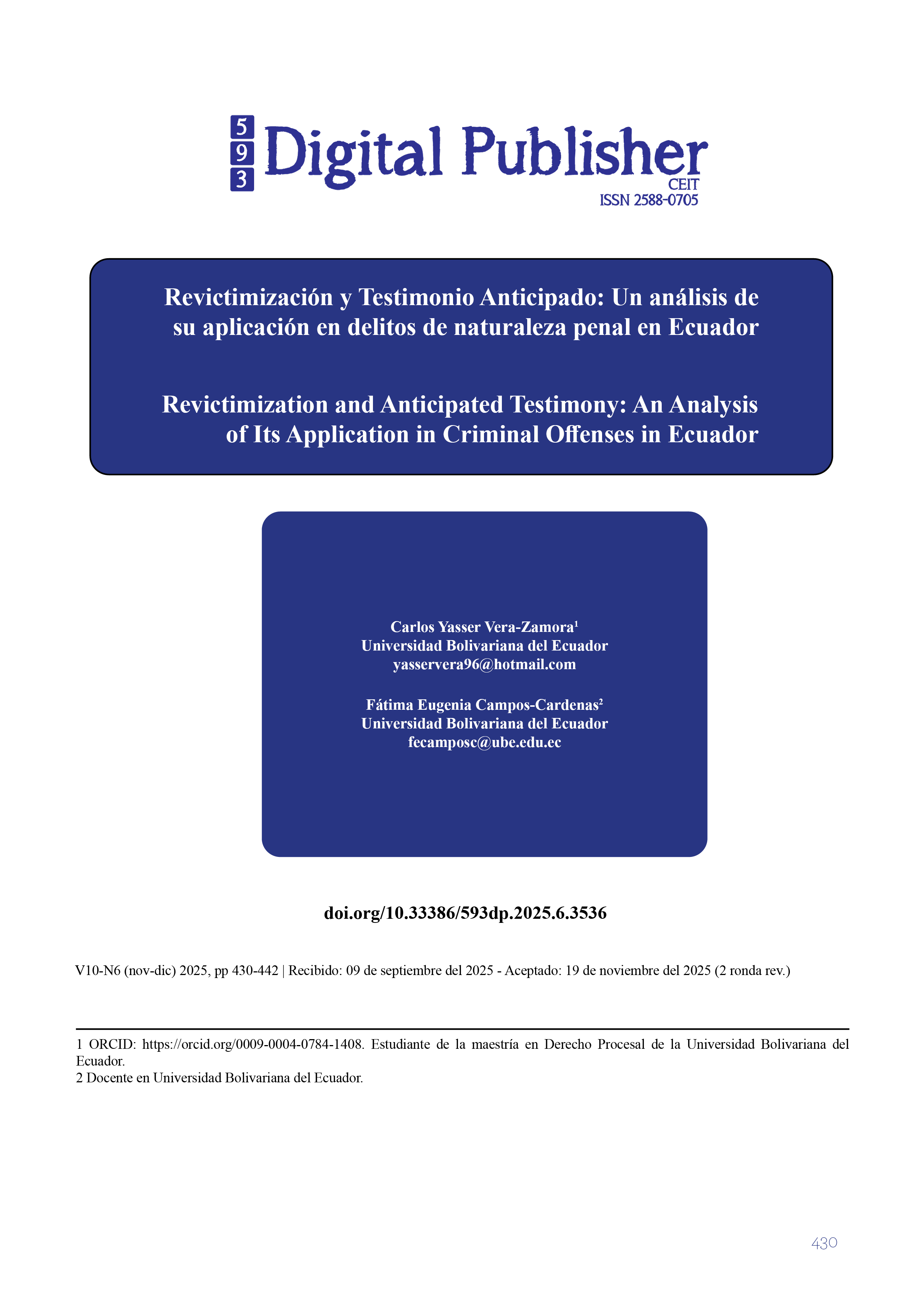Revictimization and Anticipated Testimony: An Analysis of Its Application in Criminal Offenses in Ecuador
Main Article Content
Abstract
The Ecuadorian legal framework provides for the protection of the victims in criminal proceedings. One of the tools available for such protection is anticipated testimony. This research examines anticipated testimony as a legal mechanism established with the purpose of gathering, prior to the trial stages, the statement of a person who has been the victim of a criminal offense, to prevent revictimization and safeguarding their personal safety and integrity. The objective of this study is to analyze the application of anticipated testimony in criminal offenses and its impact on the revictimization of victims within judicial proceedings. To achieve this, a methodology based on bibliographic review and current Ecuadorian regulations is employed as primary sources, allowing for a correlation between the collected data and the stated objective. This study concludes that the lack of training among justice system operators leads to violations of the provisions established in Ecuador´s legal framework, particularly about the right to non-revictimization.
Downloads
Article Details

This work is licensed under a Creative Commons Attribution-NonCommercial-ShareAlike 4.0 International License.
1. Derechos de autor
Las obras que se publican en 593 Digital Publisher CEIT están sujetas a los siguientes términos:
1.1. 593 Digital Publisher CEIT, conserva los derechos patrimoniales (copyright) de las obras publicadas, favorece y permite la reutilización de las mismas bajo la licencia Licencia Creative Commons 4.0 de Reconocimiento-NoComercial-CompartirIgual 4.0, por lo cual se pueden copiar, usar, difundir, transmitir y exponer públicamente, siempre que:
1.1.a. Se cite la autoría y fuente original de su publicación (revista, editorial, URL).
1.1.b. No se usen para fines comerciales u onerosos.
1.1.c. Se mencione la existencia y especificaciones de esta licencia de uso.
References
Corte Nacional de Justicia. Absolución de consultas: INVESTIGACIÓN PREVIA - TESTIMONIO ANTICIPADO DE LA VÍCTIMA, 1103-P-CNJ-2018 (2018, 13 de septiembre). https://www.cortenacional.gob.ec/cnj/images/pdf/consultas_absueltas/Penales/iprevia/003.pdf
Asamblea General de las Naciones Unidas (1985, 29 de noviembre). Declaración sobre los principios fundamentales de justicia para las víctimas de delitos y del abuso de poder (Resolución 40/34). Naciones Unidas, Oficina del Alto Comisionado para los Derechos Humanos. https://www.ohchr.org/es/instruments-mechanisms/instruments/declaration-basic-principles-justice-victims-crime-and-abuse
Burbano, R. J., y Tenecota Huerta, L. F (2025). Análisis jurídico del derecho a la no revictimización en el delito de violación en Ecuador. Revista 593 Digital Publisher CEIT, 10(2), 86–100. https://doi.org/10.33386/593dp.2025.2.2983
Calva Brito, P. I (2024). El testimonio anticipado de la víctima menor de edad en delitos sexuales frente al principio de contradicción. Revista 593 Digital Publisher CEIT, 9(6), 736–751. https://doi.org/10.33386/593dp.2024.6.2691
Carpio Dávila, J. F (2019). El testimonio anticipado frente a los principios que rigen la prueba y los derechos del procesado [Tesis de maestría, Universidad del Azuay]. https://dspace.uazuay.edu.ec/bitstream/datos/9341/1/14983.pdf
Código Orgánico Integral Penal. [COIP]. Registro Oficial Suplemento 180 de 2014. 10 de febrero de 2014 (Ecuador).
Constitución de la República del Ecuador [CRE], Art. 78. 2008, 20 de octubre. https://www.oas.org/juridico/pdfs/mesicic4_ecu_const.pdf
Corte Interamericana de Derechos Humanos (2018). Cuadernillo de jurisprudencia de la Corte Interamericana de Derechos Humanos No. 4: Derechos humanos y mujeres. https://www.corteidh.or.cr/sitios/libros/todos/docs/cuadernillo4.pdf
Espinoza Añazco, E. P., y Correa Calderón, J. E (2022). La denuncia y el testimonio anticipado de víctimas de violación, en etapa de juicio. Revista Polo del Conocimiento, 7(10), 1935–1954. https://doi.org/10.23857/pc.v7i10.2746
Gencón Cabello, J. E., y Rovira Jurado, Z. E (2024). Testimonio anticipado como prueba fundamental, en el ámbito de delitos sexuales: Desafíos en la legislación ecuatoriana. Revista Ciencias Pedagógicas e Innovación, 12(2), 89–100. https://doi.org/10.26423/rcpi.v12i2.805
Gutiérrez, C., Coronel, E., y Pérez, C. A (2009). Revisión teórica del concepto de victimización secundaria. Revista Liberabit, 15(1), 49–58. http://www.scielo.org.pe/pdf/liber/v15n1/a06v15n1.pdf
Human Rights Watch (2025). Informe mundial 2025: Capítulo sobre Ecuador. https://www.hrw.org/world-report/2025/country-chapters/ecuador
Naranjo Luzuriaga, E. J., Bosquez Remache, J. D., Granja Zurita, D. F., y Paredes López, J. A (2023). Revisión sistemática para propuesta de calidad metodológica en la docencia a las ciencias jurídicas. Revista Bibliotecas. Anales de Investigación, 19(Esp.1), 1–7. https://dialnet.unirioja.es/descarga/articulo/9107695.pdf
Nizama Valladolid, M., y Nizama Chávez, L. M (2020). El enfoque cualitativo en la investigación jurídica, proyecto de investigación cualitativa y seminario de tesis. Revista VOX JURIS, 38(2), 69–90. https://doi.org/10.24265/voxjuris.2020.v38n2.05
Pauta Polo, V., y Zamora Vázquez, A. F (2024). Vacío jurídico en el Código Orgánico Integral Penal respecto a la necesidad del procesado de comparecer a la toma de testimonio anticipado. Revista Religación, 9(39), 1–17. https://doi.org/10.46652/rgn.v9i39.1180
Pincay Rodríguez, Y. L (2024). Testimonio anticipado en el ámbito de los delitos sexuales en el Ecuador. Revista Científica de Educación Superior y Gobernanza Interuniversitaria Aula 24, 6(9), 41–54. https://doi.org/10.56124/aula24.v6i9.004
Plúa Briones, J. A., Plúa Barcia, S. G., y Ochoa Soledispa, J (2024). El testimonio anticipado como valor probatorio en los delitos sexuales. Ciencia Latina Revista Científica Multidisciplinar, 8(4), 7677–7698. https://doi.org/10.37811/cl_rcm.v8i4.12938
Prado Falconí, F., y Sotomayor Plaza, J (2022). Vulneración de la garantía del debido proceso en el derecho a la defensa del investigado, afectado por la toma del testimonio anticipado en delitos sexuales. Revista Metropolitana de Ciencias Aplicadas, 5(1), 88–95. https://www.redalyc.org/articulo.oa?id=721778113012
Rodríguez Cairo, V., Vilchez Olivares, P. A., y Obando Peralta, E. C (2024). Revisión sistemática de literatura científica aplicada a la investigación jurídica. Revista Pedagogía Universitaria y Didáctica del Derecho, 11(1), 63–91. https://pedagogiaderecho.uchile.cl/index.php/RPUD/article/view/70653/76703
Corte Constitucional del Ecuador. (2022, 20 de julio). Sentencia No. 2467-17-EP/22. https://esacc.corteconstitucional.gob.ec/storage/api/v1/10_DWL_FL/e2NhcnBldGE6J3RyYW1pdGUnLCB1dWlkOidkN2E0YzYzNS0wMzU0LTRlYTctYjUwYi1mYTNlMmY5NDdjZTEucGRmJ30
Unger, J. L (2015). Víctimas y revictimización: Reflexiones en torno a la finalidad del proceso penal. Revista XI Jornadas de Sociología. Facultad de Ciencias Sociales. https://cdsa.aacademica.org/000-061/1185.pdf
Yanes Sevilla, M. D (2021). El testimonio anticipado como medio de prueba en delitos de abuso sexual [Tesis de maestría, Universidad Andina Simón Bolívar, Sede Ecuador]. https://repositorio.uasb.edu.ec/bitstream/10644/8202/1/T3586-MDPE-Yanes-El%20testimonio.pdf
Yépez Andrade, M (2015). La víctima en el Código Orgánico Integral Penal en Ávila Santamaría (Ed.), Código Orgánico Integral Penal: Hacia su mejor comprensión y aplicación (pp. 163–176). Universidad Andina Simón Bolívar / Corporación Editora Nacional.



